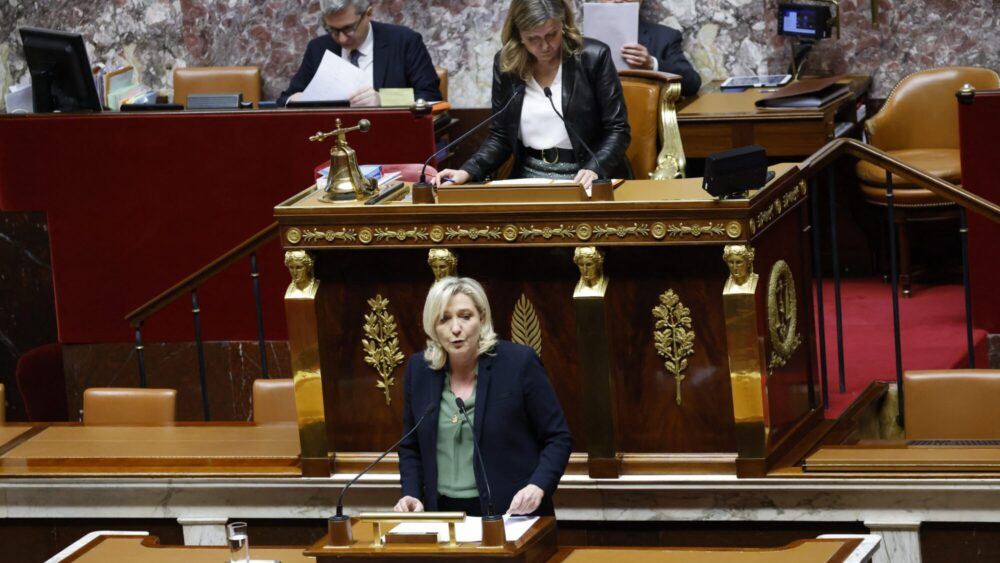
Rassemblement National parliamentary group president Marine Le Pen speaks at the National Assembly in Paris.
Photo: LUDOVIC MARIN/AFP
On Thursday, October 12th, the French National Assembly examined bills put forward by the Rassemblement National. It was an important moment in parliamentary life for gauging the ability of the nationalist Right party, whose group of MPs is led by Marine Le Pen, to interact with other political forces. The day ended in abject failure, as not a single text proposed by the RN was voted on, proving that the famous ‘cordon sanitaire’ still exists.
Under the rules of the French National Assembly, each political group is entitled to a ‘parliamentary niche,’ i.e., one day per ordinary session of the Assembly, during which it can set the agenda and submit bills of its choice for debate. On Thursday, October 12th, the Rassemblement National, which has had a group of 88 MPs since the 2022 legislative elections, had its own day for the first time in its history. The group of MPs led by Marine Le Pen carefully worked out the programme for this day—a moment traditionally eagerly awaited by opposition groups, which have a margin for manoeuvre that they do not normally have. The RN MPs had to submit a series of texts on duly chosen subjects for consideration by their colleagues, which were both consensual—in order to gain the support of MPs outside of their political family—and in line with their programme and political priorities.
Some of the bills put to the vote represented subjects dear to the RN and marked on the Right, such as automatic bone testing for unaccompanied migrant minors, a ban on ‘inclusive’ writing, and the withdrawal of family allowances for juvenile offenders convicted by the courts. Others were deliberately chosen in the hope of winning broad support, including from the Left, such as classifying endometriosis as a long-term condition so that women suffering from the disease would be better covered by social security and reinstating the regulated gas tariff. The trap was cleverly set, even in the opinion of a member of parliament from the government party interviewed by BFM: “It’s complicated to oppose endometriosis, that’s for sure. That’s why they chose it in the first place. When you refuse to vote for a text of this type, you inevitably come across as a villain.”
But once the debates got underway, things didn’t go as well as the RN would have liked. Once again, the ‘cordon sanitaire’ reflex came into full play, preventing Marine Le Pen’s party from defending its texts and garnering votes beyond its own group as it had hoped.
The RN was only able to present its first five texts: on endometriosis, the abolition of family allowances, energy prices, inclusive writing, and aid for working students. The discussions took too long to allow all the bills to be presented. Moreover, the bills fell one after the other and were eventually withdrawn by their authors, having been emptied of their substance by deletion amendments voted by opponents of the RN.
The discussions took place in a particularly stormy atmosphere. MP Sandrine Rousseau of the Green Party lashed out violently at the RN over the text on endometriosis, accusing the national right-wing party of manipulation: “They’re taking our fights, they’re taking our struggles, they’re taking our words,” she yelled, announcing that she would not be voting for the law, even though a similar proposal had been tabled by a left-wing MP a few months ago. France Insoumise in turn accused the RN of being “the worst opponents of women’s rights,” to which Marine Le Pen responded bluntly by recalling the Insoumis’ support for Hamas terrorists: “Friends of yours throw women’s bodies on pick-ups; they spit on them after raping them and after dismembering them, so I think you should objectively show some modesty today.”
At several points during the session, tempers flared and insults were exchanged between MPs on all sides. However, the party of Jordan Bardella and Marine Le Pen did make some meagre progress: on three occasions, MPs from the Les Républicains (LR) party announced that they would vote in favour of the RN’s texts, on the text concerning endometriosis, on the law calling for the withdrawal of family allowances for parents of criminal children, and on the ban on inclusive writing, for the sake of consistency, since the centre-right party is itself in favour of these measures. In January, a number of LR MPs had already voted in favour of a text proposed by the RN advocating the reinstatement of uniforms in schools. But this alliance between the right-wing parties on the floor of the assembly is still very tentative: very few LR MPs were present at the session, making their vote of support almost insignificant.
The results of October 12th were therefore very disappointing for the Rassemblement National. But the leading opposition party to Emmanuel Macron still intends to use the day to denounce the sectarianism of other political groupings, seen as incapable of discerning the common good through their ideological blindness.
